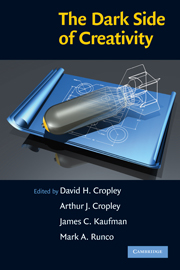Book contents
- Frontmatter
- Contents
- List of Contributors
- 1 The Dark Side of Creativity: What Is It?
- 2 Creativity Has No Dark Side
- 3 Positive Creativity and Negative Creativity (and Unintended Consequences)
- 4 Subjugating the Creative Mind: The Soviet Biological Weapons Program and the Role of the State
- 5 Imagining the Bomb: Robert Oppenheimer, Nuclear Weapons, and the Assimilation of Technological Innovation
- 6 The Innovation Dilemma: Some Risks of Creativity in Strategic Agency
- 7 Early Creativity as a Constraint on Future Achievement
- 8 Boundless Creativity
- 9 Reviewing the Art of Crime: What, If Anything, Do Criminals and Artists/Designers Have in Common?
- 10 Creativity in Confinement
- 11 Creativity and Crime: How Criminals Use Creativity to Succeed
- 12 So You Want to Become a Creative Genius? You Must Be Crazy!
- 13 Both Sides of the Coin? Personality, Deviance, and Creative Behavior
- 14 Neurosis: The Dark Side of Emotional Creativity
- 15 Dangling from a Tassel on the Fabric of Socially Constructed Reality: Reflections on the Creative Writing Process
- 16 Creativity in the Classroom: The Dark Side
- 17 The Dark Side of Creativity and How to Combat It
- 18 A Systems Engineering Approach to Counterterrorism
- 19 Malevolent Innovation: Opposing the Dark Side of Creativity
- 20 Summary – The Dark Side of Creativity: A Differentiated Model
- Index
- References
10 - Creativity in Confinement
Published online by Cambridge University Press: 05 June 2012
- Frontmatter
- Contents
- List of Contributors
- 1 The Dark Side of Creativity: What Is It?
- 2 Creativity Has No Dark Side
- 3 Positive Creativity and Negative Creativity (and Unintended Consequences)
- 4 Subjugating the Creative Mind: The Soviet Biological Weapons Program and the Role of the State
- 5 Imagining the Bomb: Robert Oppenheimer, Nuclear Weapons, and the Assimilation of Technological Innovation
- 6 The Innovation Dilemma: Some Risks of Creativity in Strategic Agency
- 7 Early Creativity as a Constraint on Future Achievement
- 8 Boundless Creativity
- 9 Reviewing the Art of Crime: What, If Anything, Do Criminals and Artists/Designers Have in Common?
- 10 Creativity in Confinement
- 11 Creativity and Crime: How Criminals Use Creativity to Succeed
- 12 So You Want to Become a Creative Genius? You Must Be Crazy!
- 13 Both Sides of the Coin? Personality, Deviance, and Creative Behavior
- 14 Neurosis: The Dark Side of Emotional Creativity
- 15 Dangling from a Tassel on the Fabric of Socially Constructed Reality: Reflections on the Creative Writing Process
- 16 Creativity in the Classroom: The Dark Side
- 17 The Dark Side of Creativity and How to Combat It
- 18 A Systems Engineering Approach to Counterterrorism
- 19 Malevolent Innovation: Opposing the Dark Side of Creativity
- 20 Summary – The Dark Side of Creativity: A Differentiated Model
- Index
- References
Summary
The number of American citizens who are incarcerated each year has been increasing for over a century. This number has increased dramatically in the last 20 years as the United States has developed a mind-set of crime control as the main goal of its sentencing laws. Other countries share the American use of incarceration to penalize those who break the law and are considered dangerous. However, the United States incarcerates more citizens and for longer sentences than any other developed nation (Schmalleger & Smykla, 2008). Legislation such as the “three strikes law” and the federal “truth in sentencing” law may help American citizens to feel safe, but it has contributed to America having the largest prison population per capita in the world (Walsh & Ellis, 2007). Numbers of both men and women who are in state prisons and jails are increasing every year. The Bureau of Justice Statistics found that on June 30, 2007, over 115,000 women and almost 1½ million men were incarcerated in state or federal prisons. The Bureau of Justice Statistics estimates that over 509 people are sentenced as prisoners per 100,000 U.S. residents. This is an increase from their latest figure at year-end 2006. The Bureau of Justice Statistics indicated that local jails had also increased their populations from 2006 to mid-year 2007 and held over 766,000 individuals who were awaiting trial, serving a sentence of one year or under, or waiting for a prison bed to become available.
Information
- Type
- Chapter
- Information
- The Dark Side of Creativity , pp. 177 - 203Publisher: Cambridge University PressPrint publication year: 2010
References
Accessibility standard: Unknown
Why this information is here
This section outlines the accessibility features of this content - including support for screen readers, full keyboard navigation and high-contrast display options. This may not be relevant for you.Accessibility Information
- 6
- Cited by
